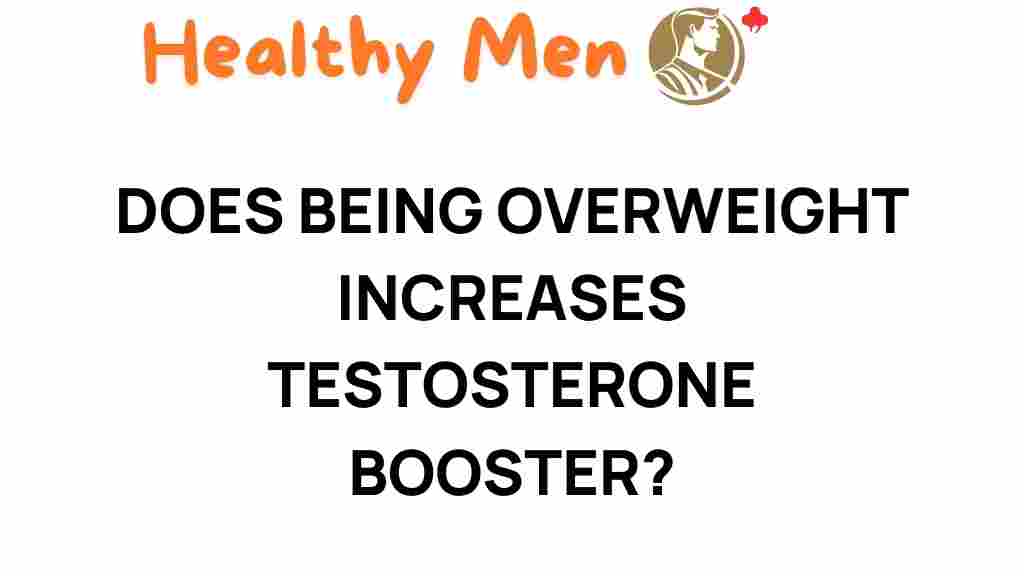Unraveling the Testosterone Paradox: Does Weight Influence Levels?
The relationship between testosterone and body weight is a complex and often misunderstood topic. As we delve into the intricacies of hormones, metabolism, and overall health, it becomes clear that understanding this connection is vital for anyone focused on fitness, weight management, and wellness. In this article, we will explore how being overweight can influence testosterone levels, the implications for health, and practical steps to manage weight and improve hormonal balance.
Understanding Testosterone
Testosterone is a hormone primarily produced in the testicles in men and in smaller amounts in women’s ovaries and adrenal glands. It plays a critical role in several bodily functions, including:
- Regulating libido and sexual function
- Supporting muscle mass and strength
- Influencing fat distribution
- Contributing to bone density
- Affecting mood and cognitive function
Given its wide-ranging effects, maintaining healthy testosterone levels is essential for overall well-being. However, external factors, including body weight, can significantly impact these levels.
The Impact of Weight on Testosterone Levels
Research shows a clear link between being overweight and lower testosterone levels. Here’s how weight can influence hormone levels:
- Fat Tissue and Estrogen: Excess fat tissue can convert testosterone into estrogen, leading to reduced testosterone levels.
- Insulin Resistance: Overweight individuals often experience insulin resistance, which can disrupt hormonal balance, including testosterone.
- Inflammation: Obesity is associated with chronic inflammation, which can negatively impact the production of testosterone.
Why Does This Matter for Health?
Low testosterone levels can lead to several health issues, including:
- Decreased libido and sexual dysfunction
- Increased body fat and reduced muscle mass
- Fatigue and decreased energy levels
- Depression and mood swings
- Increased risk of cardiovascular diseases
Understanding these risks emphasizes the importance of addressing weight management not just for physical appearance, but for overall health and hormonal balance.
Step-by-Step Process to Manage Weight and Improve Testosterone Levels
Here’s a structured approach to managing weight effectively while aiming to optimize testosterone levels:
1. Adopt a Balanced Diet
A nutritious diet plays a crucial role in hormone regulation. Focus on:
- Whole Foods: Incorporate fruits, vegetables, whole grains, lean proteins, and healthy fats.
- Avoid Processed Foods: Limit sugar and refined carbohydrates, which can lead to weight gain and insulin spikes.
- Healthy Fats: Include sources of omega-3 fatty acids, such as fish, nuts, and seeds, which can help improve hormone production.
2. Incorporate Regular Exercise
Exercise is essential for maintaining a healthy weight and boosting testosterone levels. Aim for a mix of:
- Strength Training: Lifting weights can increase muscle mass and promote testosterone production.
- Cardiovascular Exercise: Activities like running, cycling, or swimming can help burn calories and improve metabolism.
- High-Intensity Interval Training (HIIT): Short bursts of intense activity followed by rest can be particularly effective for weight loss.
3. Prioritize Sleep
Quality sleep is critical for hormone production, including testosterone. Aim for:
- 7-9 Hours of Sleep: Ensure you are well-rested each night.
- Consistent Sleep Schedule: Go to bed and wake up at the same time each day to regulate your body’s internal clock.
4. Manage Stress
Chronic stress can lead to elevated cortisol levels, which may inhibit testosterone production. Consider:
- Meditation and Mindfulness: Practice relaxation techniques to reduce stress.
- Regular Physical Activity: Exercise is a proven stress reliever.
- Social Connections: Maintain relationships and engage in social activities for emotional support.
5. Consult with a Healthcare Professional
If you’re struggling with weight management and suspect low testosterone levels, it’s wise to consult a healthcare provider. They can offer:
- Testing: Hormonal testing to check testosterone levels.
- Personalized Guidance: Recommendations for diet, exercise, and potential treatments.
Troubleshooting Tips
Even with the best intentions, you may face hurdles in managing weight and testosterone levels. Here are some troubleshooting tips:
- Plateaus in Weight Loss: If you hit a plateau, consider adjusting your caloric intake or changing your workout routine.
- Low Energy Levels: Ensure you’re eating enough calories to support your activity level and avoid overly restrictive diets.
- Monitoring Progress: Keep track of your weight, testosterone levels, and how you feel to identify patterns and make adjustments.
Conclusion
The connection between testosterone and body weight is significant, and understanding it can empower individuals to take charge of their health and wellness. By adopting a balanced lifestyle that includes proper nutrition, regular exercise, adequate sleep, and stress management, individuals can effectively manage their weight and support healthy testosterone levels.
For more information on maintaining hormonal balance and overall health, consider visiting this resource that offers detailed insights into lifestyle changes.
In summary, the testosterone paradox is not just about the numbers on a scale but about fostering a holistic approach to health that recognizes the interplay between weight, hormones, and well-being.
This article is in the category Conditions and created by healthymen Team
